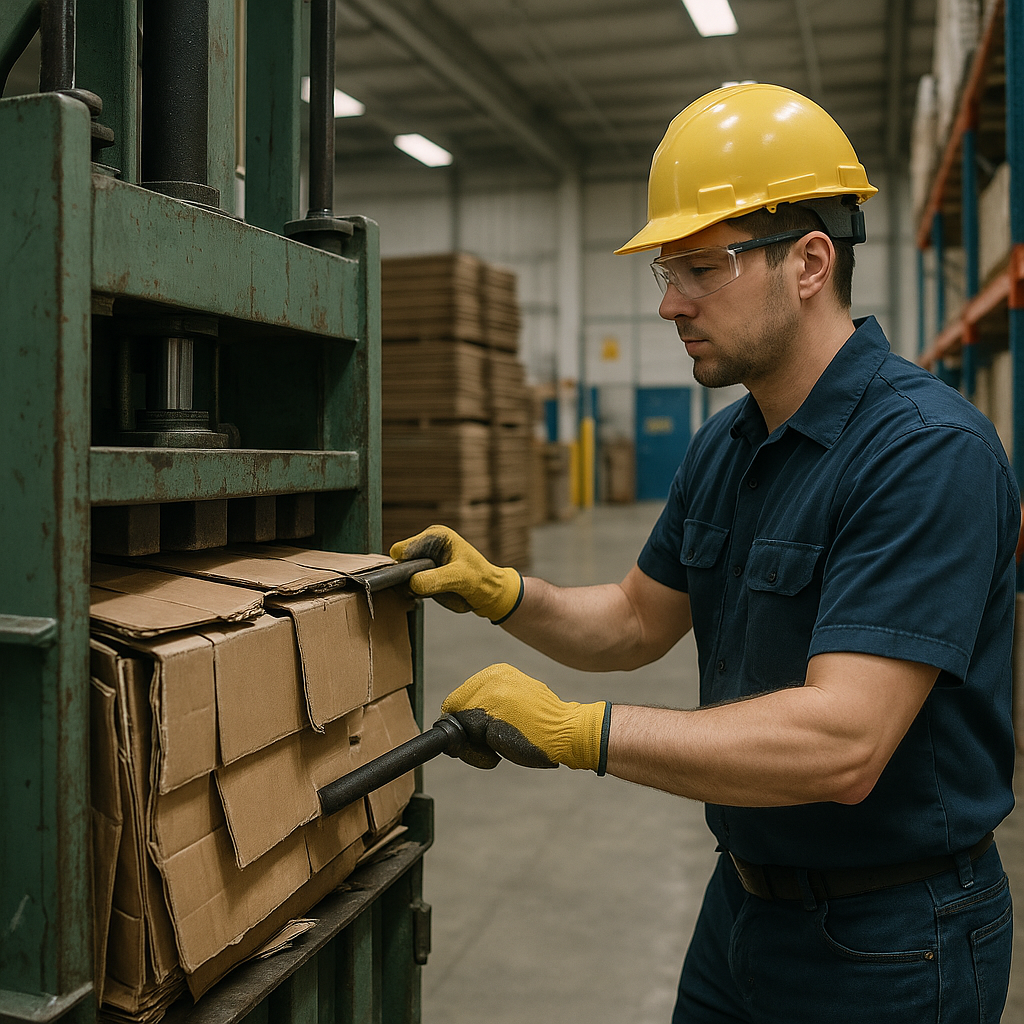5901 Botham Jean Blvd, Dallas, TX 75215
What Are On-Site Baling Services?
July 3, 2025Managing large volumes of scrap metal can become a logistical challenge for businesses. On-site baling services provide an efficient solution by bringing mobile baling equipment directly to your facility. These services employ powerful hydraulic balers to compress and package various scrap materials into compact, uniform bales at the source of the waste.
Mobile balers convert loose scrap metal, junk car bodies, and other recyclable materials into dense, transportable packages. This process significantly reduces the volume of materials, making them easier to handle and transport. The baling equipment can manage everything from aluminum scraps to entire vehicle frames without needing transportation to a processing facility first.
The immediate benefits are substantial. Businesses save valuable space that would otherwise be filled with unsightly scrap piles. The compression process allows more material to be transported in fewer trips, which significantly reduces transportation costs. On-site baling also removes the expense and hassle of moving bulky scrap to distant recycling facilities, creating both economic and environmental advantages for forward-thinking companies.
How Does the On-Site Baling Process Work?

On-site baling transforms loose scrap metal into compact, easily transportable bales directly at your facility. This efficient process eliminates double handling and significantly reduces transportation volume and costs. Here’s how this streamlined process unfolds in three main stages.
1. Initial Consultation and Scheduling
The process begins when you contact a mobile baling service provider. During this initial consultation, you’ll discuss the type and volume of materials that need baling. The service representative will inquire about the specific metals involved, approximate quantities, and your facility’s layout to determine equipment accessibility.
After gathering this information, the service provider will propose a suitable timeframe for the baling operation. Many mobile baling services can accommodate urgent requests, often scheduling appointments within days of initial contact.
2. On-Site Assessment and Planning
When the mobile baling team arrives at your facility, they conduct a thorough inspection of the materials. This critical step involves evaluating several factors to optimize the baling process:
- Material composition (ferrous vs. non-ferrous metals)
- Quantity and density of the scrap
- Current storage conditions
- Space constraints and access points
- Safety considerations
Based on this assessment, the team develops a tailored approach for your specific situation. They determine the ideal baling sequence, positioning of equipment, and the most efficient way to move materials through the baling process.
3. Mobile Baling Operation
The baling operation employs state-of-the-art mobile equipment to transform loose scrap into dense, uniform bales. This phase involves several coordinated steps:
First, the team positions the mobile baler in the optimal location for efficient material handling. The hydraulic systems on modern mobile balers exert tremendous force to compress even heavy-duty scrap metals effectively.
Next, the team loads the scrap metal into the baler’s chamber using integrated cranes or grapple systems. Most mobile balers feature 360° rotatable grapples with remote control capabilities, allowing for precise material handling with minimal manual intervention.
The baler then compresses the material using powerful hydraulic rams. These rams apply force from multiple directions to create dense, stackable bales. In three-compression models, both the wing doors and the main ram squeeze the metal simultaneously for maximum density.
Finally, the completed bales are ejected from the machine, ready for immediate transport. These uniform bales typically occupy 3-5 times less space than loose scrap, dramatically reducing your shipping costs.
| Aspect | Loose Scrap | Baled Material |
|---|---|---|
| Volume Reduction | More Storage Space Required | Up to 90% Space Reduction |
| Transportation Cost | Higher Due to More Trips | Reduced Due to Fewer Trips |
| Handling | More Labor Intensive | Streamlined and Efficient |
| Environmental Impact | Higher Carbon Emissions Due to More Transport | Lower Emissions Due to Fewer Transport Trips |
Benefits of On-Site Baling
On-site baling delivers immediate advantages over traditional scrap handling methods. By compressing materials at your location, you eliminate the need to transport loose scrap to a processing facility. This reduction in material handling steps translates to lower labor costs and decreased risk of material loss during transport.
The process also frees up valuable space at your facility by converting bulky, irregularly shaped scrap into uniform, stackable bales. For businesses dealing with continuous scrap generation, this space-saving benefit can significantly improve operational efficiency.
What Are the Benefits of On-Site Baling Services?
On-site baling transforms scrap metal management for facilities handling significant metal waste. This service brings specialized equipment directly to your location, offering considerable advantages over traditional scrap handling methods.
Efficient Scrap Metal Removal
Mobile balers quickly compress bulky scrap into compact, uniform bales ready for transport. This process significantly reduces the volume of material, allowing for more efficient removal from your facility.
A standard truckload of loose scrap might contain only a fraction of what can be transported when carrying compressed bales. This efficiency means fewer trips and faster clearing of accumulated scrap.
Significant Cost Savings
Transportation costs represent one of the largest expenses in scrap metal management. On-site baling directly addresses this challenge by maximizing payload capacity for each shipment.
When scrap is compressed into dense, uniform bales, transportation costs can decrease by up to 30-40% compared to hauling loose materials. These savings accumulate quickly, especially for businesses generating large volumes of scrap regularly.
Enhanced Workplace Safety
Loose scrap metal creates numerous workplace hazards. Sharp edges pose cutting risks, while unstable piles can shift or collapse unexpectedly.
By promptly processing and removing scrap through on-site baling, facilities eliminate these dangers and free up valuable workspace. This not only reduces accident risks but also improves operational flow and efficiency.
Environmental Benefits
The environmental advantages of on-site baling extend beyond basic recycling. When scrap is efficiently baled, fewer transportation vehicles are needed for removal, directly reducing carbon emissions.
Additionally, baling ensures higher-quality material separation, which increases recycling efficiency at processing facilities. This supports more complete material recovery and reduces waste sent to landfills.
Convenience and Flexibility
On-site baling services come to your location on your schedule. This eliminates the logistics of transporting loose scrap to distant processing facilities.
Modern mobile balers can handle diverse materials, from aluminum cans and sheet metal to larger items like appliances or industrial scrap. This versatility means one service can address multiple waste streams.
Competitive Pricing Models
Most on-site baling services offer flexible pricing structures based on volume, material type, and frequency of service. This adaptability allows businesses to develop cost-effective waste management strategies tailored to their specific needs.
Many providers also offer revenue-sharing options where the value of the recycled materials offsets service costs. For high-volume generators, this can transform scrap management from a cost center into a potential revenue source.
Space Optimization
Storage space comes at a premium in most facilities. Loose scrap takes up significantly more room than neatly stacked bales. By compressing materials on-site, businesses can reclaim valuable square footage for productive uses.
The compact nature of baled scrap also provides more organized storage options. Instead of sprawling collection areas, bales can be neatly stacked and categorized by material type.
What Types of Materials Can Be Handled by On-Site Baling Services?

On-site baling services can process a wide range of materials. Modern baling equipment’s versatility allows for efficient handling of multiple waste streams, making on-site baling an excellent solution for businesses with diverse recycling needs.
Scrap Metals
Modern balers excel at compressing various metal types into dense, transportable cubes. Commonly processed metals include:
- Aluminum – From extrusions to cans and siding materials
- Copper – Including wiring, piping, and various copper alloys
- Brass – Found in plumbing fixtures, musical instruments, and decorative elements
- Stainless Steel – From kitchen equipment to industrial components
- Iron – Including cast iron and wrought iron products
Processing these valuable metals on-site helps businesses reclaim space while maximizing the value of their scrap materials.
Automotive Materials
On-site baling services offer effective solutions for automotive recycling needs. Balers can process:
- Junk car bodies (through specialized car logging services)
- Auto parts and components
- Scrap from automotive manufacturing
- Used tires (with specialized equipment)
These services are particularly beneficial for auto salvage yards and manufacturing facilities generating significant automotive waste.
Appliances and Equipment
Bulky items like appliances can be effectively processed through on-site baling. Common materials include:
- Refrigerators (after proper removal of hazardous components)
- Washing machines and dryers
- Dishwashers
- Farm machinery and equipment
- Industrial equipment
Baling reduces their volume significantly, making storage and transportation more economical.
| Papers | Newspapers, Magazines, Office Paper |
| Cardboard | Regular and Heavy-Duty |
| Plastics | Bottles, Containers, Films |
| Metals | Aluminum, Tin Cans |
Construction and Demolition Materials
The construction industry generates substantial waste effectively managed through on-site baling. This includes:
- Scrap metal from construction sites
- Demolition debris
- Metal roofing and siding
- Structural steel components
- Conduit and electrical materials
On-site baling enables construction companies to manage waste efficiently on-site, reducing transportation costs and improving site organization.
Paper and Cardboard
Many on-site baling services also handle paper-based materials such as:
- Cardboard boxes and packaging
- Office paper waste
- Newspapers and magazines
- Mixed paper products
Baling these materials creates compact, easily transportable units that optimize recycling efficiency.
The flexibility of modern baling equipment means that recycling operations can handle most recyclable materials with a single system. This adaptability makes on-site baling an attractive option for businesses looking to streamline waste management while maximizing resource recovery.
Conclusion: The Value of On-Site Baling Services

On-site baling services offer a transformative approach to scrap management. These services bring specialized equipment directly to business locations, creating an efficient solution for handling large volumes of recyclable materials. Compressing scrap into uniform, compact bales reduces storage space requirements by up to 90% and streamlines transportation logistics, resulting in significant cost savings.
In addition to financial benefits, on-site baling delivers substantial environmental advantages by enhancing recycling rates and reducing carbon emissions from transportation. Safety improvements are another key benefit, as professional baling teams eliminate hazards associated with loose scrap materials and ensure proper handling of potentially dangerous items. For businesses seeking to optimize their recycling operations, on-site baling provides a comprehensive solution that addresses logistical challenges, environmental responsibilities, and operational efficiency in one service. To explore how on-site baling can transform your scrap management process, contact Okon Recycling at 214-717-4083.
